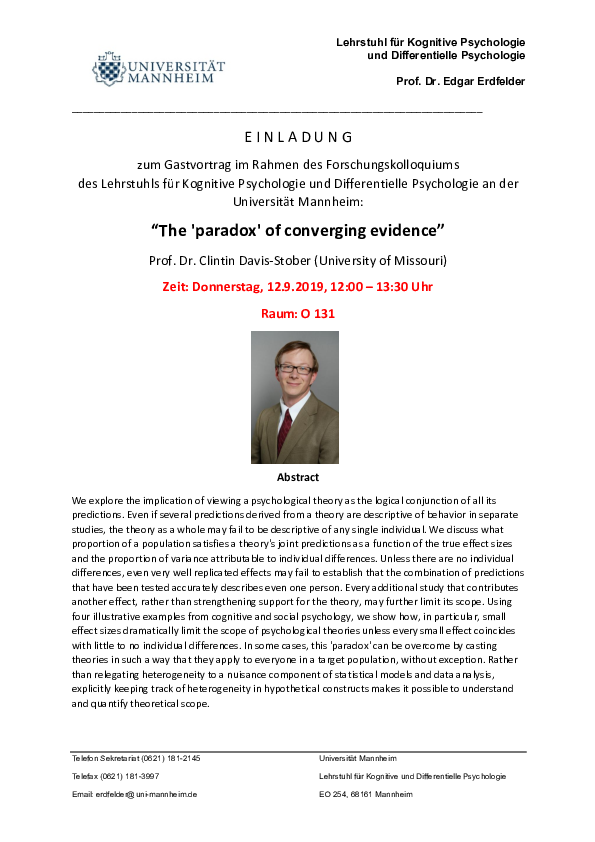Gastvortrag (Prof. Dr. Clintin Davis-Stober, University of Missouri)

Abstract:
We explore the implication of viewing a psychological theory as the logical conjunction of all its predictions. Even if several predictions derived from a theory are descriptive of behavior in separate studies, the theory as a whole may fail to be descriptive of any single individual. We discuss what proportion of a population satisfies a theory's joint predictions as a function of the true effect sizes and the proportion of variance attributable to individual differences. Unless there are no individual differences, even very well replicated effects may fail to establish that the combination of predictions that have been tested accurately describes even one person. Every additional study that contributes another effect, rather than strengthening support for the theory, may further limit its scope. Using four illustrative examples from cognitive and social psychology, we show how, in particular, small effect sizes dramatically limit the scope of psychological theories unless every small effect coincides with little to no individual differences. In some cases, this 'paradox' can be overcome by casting theories in such a way that they apply to everyone in a target population, without exception. Rather than relegating heterogeneity to a nuisance component of statistical models and data analysis, explicitly keeping track of heterogeneity in hypothetical constructs makes it possible to understand and quantify theoretical scope.We explore the implication of viewing a psychological theory as the logical conjunction of all its predictions. Even if several predictions derived from a theory are descriptive of behavior in separate studies, the theory as a whole may fail to be descriptive of any single individual. We discuss what proportion of a population satisfies a theory's joint predictions as a function of the true effect sizes and the proportion of variance attributable to individual differences. Unless there are no individual differences, even very well replicated effects may fail to establish that the combination of predictions that have been tested accurately describes even one person. Every additional study that contributes another effect, rather than strengthening support for the theory, may further limit its scope. Using four illustrative examples from cognitive and social psychology, we show how, in particular, small effect sizes dramatically limit the scope of psychological theories unless every small effect coincides with little to no individual differences. In some cases, this 'paradox' can be overcome by casting theories in such a way that they apply to everyone in a target population, without exception. Rather than relegating heterogeneity to a nuisance component of statistical models and data analysis, explicitly keeping track of heterogeneity in hypothetical constructs makes it possible to understand and quantify theoretical scope.
